We've spent 6 weeks completely renovating the ENT Sydney offices to make them 100% Covid-safe for your patients.
Find out what changes we made below and things you may consider for your practice.
What happened to ENTs in March 2020?
ENTs Australia-wide shut down ALL non-emergency office visits and surgery in March 2020.
This was based on specific advice from ASOHNS (ENT Society) and RACS (College of Surgeons).
Why did ENTs shut-down?
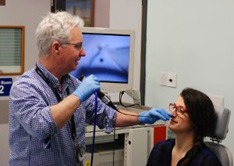
This is because almost every ENT patient requires nasendoscopy, an Aerosol Generating Procedure (AGP), putting doctors, staff and patients at risk.
What did ENT Sydney do next?
We immediately used the next 6 weeks to completely renovate the ENT Sydney offices, re-train our team and re-write our policies and procedures to make our offices 100% Covid-ready.
How many changes have been made at ENT Sydney for Covid19?
We have made over 40+ changes to our offices.
Our List of 41 Covid Safe Changes
1) Negative Pressure Consulting Rooms & Sterilisation Room
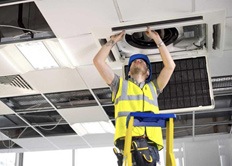
ENT Sydney’s office now has:
- Negative pressure (fresh air is drawn from outside in to the consulting rooms)
- Hospital-grade HEPA ultrafiltration
- More than 20 Air changes per hour
For ENTs, we perform Aerosol Generating Procedures (AGPs) on almost EVERY patient that enters the office. These AGPs, such as nasendoscopy, routinely cause patients to cough, sneeze and splutter. As a result ENTs are at high risk of exposure to droplets and aerosols. Because of this, negative pressure is useful to reduce risk for ENTs, patients, visitors and staff.
If you are not routinely performing AGPs, you probably DO NOT NEED negative pressure in your office.
If you would like to know more, please email us.
2) Powered air purifying respirators (PAPR)
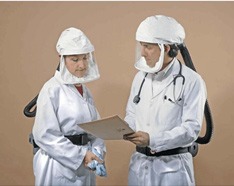
ENT Sydney's office has four PAPR units. These allow our doctors and staff to operate with complete safety.
For ENTs, we perform Aerosol Generating Procedures (AGPs) and Surgery (AGS) routinely. As a result ENTs are at high risk of exposure to droplets and aerosols. Because of this, PAPRs are useful to reduce risk for ENTs, patients and staff.
If you are not routinely performing AGS, you DO NOT NEED PAPR.
If you would like to know more, please email us.
3) Custom-built easy-clean furniture
ENT Sydney has installed custom-built workstations, chairs and airtight cupboards that are waterproof and easy to clean.
Because ENTs are exposed to droplets and aerosols from AGPs, we have redesigned our offices to facilitate easy-cleaning.
If you are not routinely performing AGPs, you probably DO NOT NEED new furniture.
However, you should aim to make your consulting room easy-clean by removing all unnecessary items and storing difficult-to-clean items in cupboards.
4) Deep cleaning
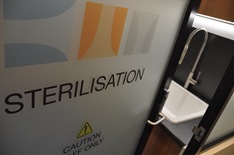
Because ENTs are exposed to droplets and aerosols from AGPs, we regularly deep clean our consulting rooms.
If you are not routinely performing AGPs, you probably DO NOT NEED to deep clean as regularly. However, you could consider using disinfectant wipes on exposed surfaces. Wipes with 70%+ Isopropyl alcohol are effective and fast. If you are having difficulty finding them, you can buy large quantities (1-5 litres) of Isopropyl alcohol (70%+ w/v) and use it on standard dry wipes.
5) Custom built perspex screen for reception desk
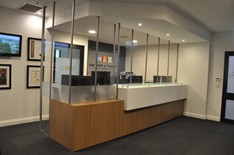
We have installed a custom wrap-around Perspex screen to protect patients and staff.
Perspex screens are an effective way to protect your staff.
Leaving open holes in the screens reduces their effectiveness.
We have installed sliding doors to provide effective protection:
The sliding door can be lifted up when required to pass something between staff and patients.
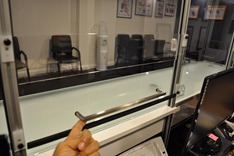
See below for how to reduce the need to pass things altogether.
If you would like to know who installed our custom-made perspex screen, please email us.
What are some of the other changes that have been made?
- Temperature checks as required. Because we are based in Norwest Private Hospital, the level of screening, cleaning and safety is much, much higher than in regular buildings, that are often next to restaurants and shops.
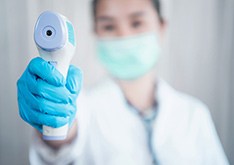
- Hand sanitiser stations throughout the office
- We have an extremely large waiting room (around 80m2) to maintain social distancing.
- Waiting room chairs have been reduced and spaced out
- When required, we place waiting room chairs in the large corridor outside the office to help with social distancing
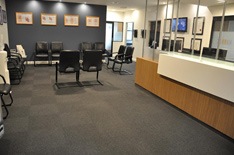
- We have removed magazines from the waiting room
- When required, patients are screened by phone the day before attending
- Patients are asked to come by themselves, unless they need a support person (eg if elderly or from a non-English-speaking background)
- Any extra visitors are asked not to stay in the waiting room (there is a coffee shop down the corridor)
- Parents can still attend with their child but are not permitted to bring siblings
- Masks are available for all patients and visitors
- Our specialist doctors wear masks to protect patients and visitors
- Patients complete forms online, so they don’t need to use paper or pens on-site
- Patients are asked to scan or take pictures of their referral/ reports/ paperwork and send to the office by email
- Payments can be made online to avoid using EFTPOS terminals
- The reception desk has been moved to create more space
- Our nursing staff that contact patients wear custom surgical scrubs
- Consult rooms have been emptied of everything unnecessary
- New custom-made built-in desks with easy-to-wipe surfaces
- All fabric chairs have been replaced with easy-to-wipe surfaces
- All equipment is being stored in airtight cupboards
- Perspex covers have been made to over computers and printers
- Medical-grade, dishwasher-safe, waterproof, wireless keyboards and computer mice have been installed
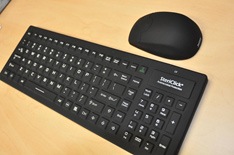
- Keyboards and mice are regularly deep-cleaned
- Perspex covers have been made for equipment
- Custom made rubbish and used-instruments bins are managed through an opening in the built-in desktop
- Perspex box for pens, stamps, desktop instruments
- Sterile instruments are only brought in to the consulting room on an individual patient basis
- Wherever possible, disposable instruments are used

- Our staff are supervised by a fully-trained nurse to clean all cameras, instruments, furniture and equipment between patients
- Our nurse wears full PPE (personal protective equipment)
- We have built a new sterilisation room to ensure the highest possible level of patient safety
- We have installed custom drawers in the walls of the consulting rooms so doctors do not need to leave the consulting room during a consultation, reducing the risk of spread.
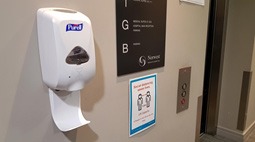
- We have thousands of Hospital-grade N95 masks and full PPE for our staff and patients
- There are hand sanitiser stations at EVERY lift entrance
- There are restrictions on the number of people allowed to use each lift
- As we are on the Ground floor, it is not necessary to use the lifts
- The waiting room chairs are cleaned throughout the day
- We have replaced our waiting room water cooler with individual water bottles, for patient convenience
- Our main surgical hospital, Lakeview Private, only admits healthy patients for elective surgery
- Lakeview Private does not admit any sick, unwell or emergency patients. It does NOT have an emergency department or an intensive care unit
Your patients are safe at ENT Sydney.
Please contact us for more information
Click here for our referral form
Click here if you would like to be notified of our next webinar on ENT for GPs
Contact us if you would like to be notified of our next webinar on ENT for GPs
- A/Professor Narinder Singh MBBS (Syd) MS (Syd) FRACS (OHNS) Rhinologist (Nose & Sinus Specialist, Snoring and OSA) | Clinical Associate Professor, University of Sydney | Head of ENT Dept, Westmead Hospital
- Dr Murray Smith B.Optom(UDW) MCO(UK) BSc(Med.) MB.BS(UNSW) DA(SA) FCORL FRACS (OHNS) Head and Neck Surgery, General ENT
- Dr June Huang MBChB FRACS (OHNS)General ENT

